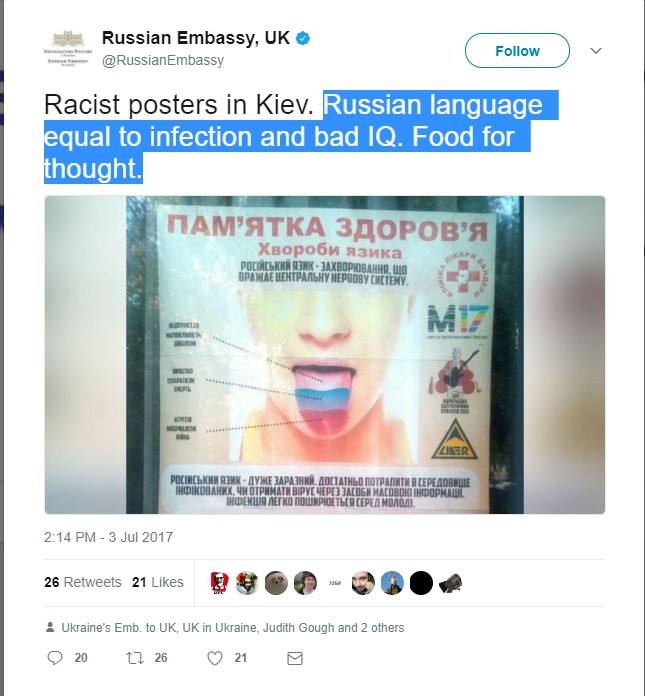It’s not just the general public that’s falling for fakes from social media these days – the Russian Embassy in the United Kingdom seems to have trouble sorting fact from fiction as well.
The embassy’s Twitter account on July 3 tweeted a picture of an anti-Russian poster that it claimed had been put up in Kyiv, with the comment: “Racist posters in Kiev (sic). Russian language equal to infection and bad IQ. Food for thought.”

The Russian embassy in UK official Twitter account post print screen. ( Courtesy)
However, no such poster has been seen on the streets of Kyiv.
The embassy apparently picked up the fake news about the supposedly anti-Russian posters in Kyiv after several Ukrainian and Russian media published a photo of the poster, which describes the Russian language as a “tongue infection.”
However, the photograph accompanying the embassy’s tweet seems to show that the poster is a poorly crafted fake. It contains punctuation and grammar errors that a Ukrainian speaker would be unlikely to make (but a Russian-speaker pretending to be a Ukrainian-speaker might).
A little digging uncovered the image’s true origins.
The poster itself is in fact authentic. It was created by Ivan Granatkin, an artist from Ukraine, who made it for the “Ukrainian Patriotic Poster” competition in 2015, which was organized by Ukraine’s Cultural Front, a Ukrainian patriotic art platform.
“Unfortunately there are some mistakes. I was a Russian-speaking guy back then and really hurried to send the poster to the competition,” Granatkin wrote in comments about the poster on Facebook.
What was portrayed by the Russian Embassy in the United Kingdom as “racism” in Ukraine turned out to be nothing more than a bad joke, military blogger and Ukrainian lawmaker Dmytro Tymchuk wrote on Facebook on July 3. In a post, Tymchuk explained the origin of the fake news.
It all started when Granatkin posted the photo of his poster in comments below a post on the page of Ukrainian TV host and singer Antin Mukharskiy, the Ukrainian Cultural Front head, on June 28. His comment collected only 11 likes in four days.
But after that, the photo appeared in Facebook trending notices, in connection with the M17 Contemporary Art Gallery, as the poster has its emblem on it.
“M17 has nothing to do with this poster, and sees this as a discrediting campaign against the gallery,” reads an official message published on M17’s Facebook page on July 3.
However, Yelyzaveta Belska, the curator of the Ukrainian Patriotic Poster 2015 competition, told the Kyiv Post that the poster was one of the 100 finalists of the competition and had been displayed in the gallery in 2015.
“More than 900 artists took part in the competition back then. The jury picked 100 finalists and organized the exhibition. Forty-four of the works in the exhibition were made by an artist from (the Russian city of) Perm as a protest against the current Russian government,” said Belska.
“After that, we sold the posters at an auction and sent the money raised to the Ukrainian military hospital in Kyiv,” Belska added.
Belska recalled that in 2015 the Russian media had also spread fake news after the exhibition opened.
“They said that the actual name of our exhibition was “Die Colorado, Die!” We had five Russian channels attending the opening of our exhibition, and not one Ukrainian one,” said Belska.
“Colorado” is an offensive term for Russians who support Russia’s war in Ukraine. It is a reference to the St. Georges Ribbon, the orange and black striped emblem of Russian nationalists, which is also the coloring pattern of the Colorado beetle, one of the worst potato pests in the world.
The false claim that the poster had been put up in Kyiv started when Ukrainian news websites Vesti.ua and Strana.ua published the picture that Granatkin had posted on Facebook, but credited to another user, who shared it with false and provocative comments.
“Scandal: The Russian language is compared to a disease in Kyiv,” wrote Vesti.
Strana.ua republished Vesti’s article, adding that posters offensive to Russian-speaking citizens had appeared in Kyiv.
The Russian media outlets Zvezda, NTV, RIA and many others immediately picked up the fake news, making it a top story on their news websites.
It was probably from one of these sites that the Russian Embassy in the United Kingdom picked up the fake news.
